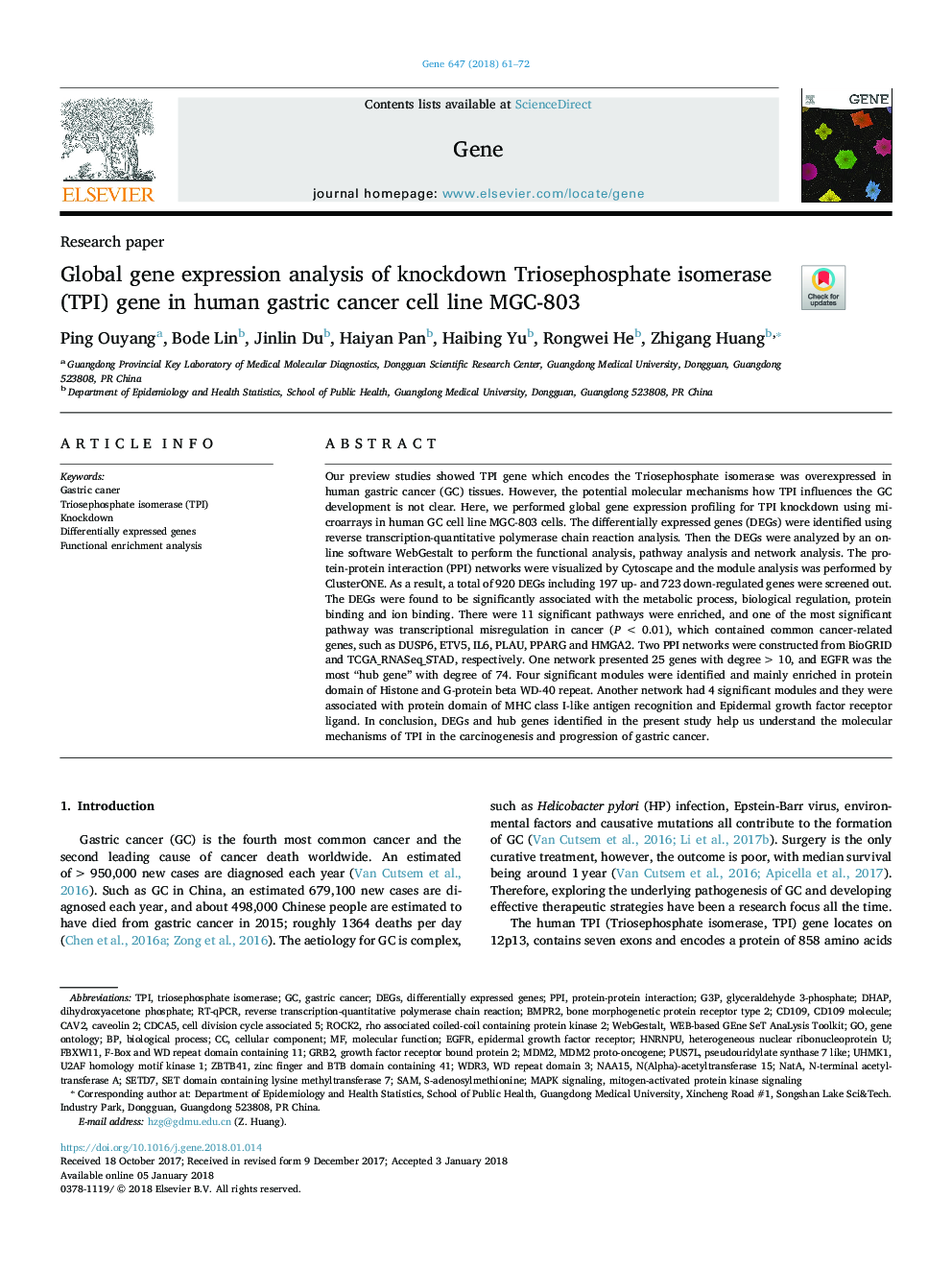| کد مقاله | کد نشریه | سال انتشار | مقاله انگلیسی | نسخه تمام متن |
|---|---|---|---|---|
| 8645570 | 1569789 | 2018 | 12 صفحه PDF | دانلود رایگان |
عنوان انگلیسی مقاله ISI
Global gene expression analysis of knockdown Triosephosphate isomerase (TPI) gene in human gastric cancer cell line MGC-803
دانلود مقاله + سفارش ترجمه
دانلود مقاله ISI انگلیسی
رایگان برای ایرانیان
کلمات کلیدی
NATASETD7heterogeneous nuclear ribonucleoprotein UCaV2CD109HnrnpuROCK2GRB2UHMK1BMPR2Triosephosphate isomeraseEGFRDEGsTPIRT-qPCRSAMPPIDHAPG3PMdm2 - MDM2S-adenosylmethionine - اس-ادنوزیل متیونینMolecular function - تابع مولکولیFunctional enrichment analysis - تجزیه و تحلیل غنی سازی عملکردیProtein-protein interaction - تعامل پروتئین-پروتئینcellular component - جزء سلولیdihydroxyacetone phosphate - دی هیدروکسی استون فسفاتGastric cancer - سرطان معدهMAPK signaling - سیگنال MAPKbiological process - فرایند بیولوژیکیKnockdown - نابودیGene ontology - هستیشناسی ژنیReverse Transcription-quantitative Polymerase Chain Reaction - واکنش زنجیره ای پلیمراز کمی رونویسی معکوسGrowth factor receptor bound protein 2 - پروتئین متصل گیرنده عامل رشد 2Differentially expressed genes - ژن های متفاوت بیان شده استglyceraldehyde 3-phosphate - گلیسرولیدید 3-فسفاتEpidermal growth factor receptor - گیرنده فاکتور رشد اپیدرمالBone morphogenetic protein receptor type 2 - گیرنده پروتئین مورفوژنیک استخوانی نوع 2
موضوعات مرتبط
علوم زیستی و بیوفناوری
بیوشیمی، ژنتیک و زیست شناسی مولکولی
ژنتیک
پیش نمایش صفحه اول مقاله

چکیده انگلیسی
Our preview studies showed TPI gene which encodes the Triosephosphate isomerase was overexpressed in human gastric cancer (GC) tissues. However, the potential molecular mechanisms how TPI influences the GC development is not clear. Here, we performed global gene expression profiling for TPI knockdown using microarrays in human GC cell line MGC-803 cells. The differentially expressed genes (DEGs) were identified using reverse transcription-quantitative polymerase chain reaction analysis. Then the DEGs were analyzed by an online software WebGestalt to perform the functional analysis, pathway analysis and network analysis. The protein-protein interaction (PPI) networks were visualized by Cytoscape and the module analysis was performed by ClusterONE. As a result, a total of 920 DEGs including 197 up- and 723 down-regulated genes were screened out. The DEGs were found to be significantly associated with the metabolic process, biological regulation, protein binding and ion binding. There were 11 significant pathways were enriched, and one of the most significant pathway was transcriptional misregulation in cancer (PÂ <Â 0.01), which contained common cancer-related genes, such as DUSP6, ETV5, IL6, PLAU, PPARG and HMGA2. Two PPI networks were constructed from BioGRID and TCGA_RNASeq_STAD, respectively. One network presented 25 genes with degree >Â 10, and EGFR was the most “hub gene” with degree of 74. Four significant modules were identified and mainly enriched in protein domain of Histone and G-protein beta WD-40 repeat. Another network had 4 significant modules and they were associated with protein domain of MHC class I-like antigen recognition and Epidermal growth factor receptor ligand. In conclusion, DEGs and hub genes identified in the present study help us understand the molecular mechanisms of TPI in the carcinogenesis and progression of gastric cancer.
ناشر
Database: Elsevier - ScienceDirect (ساینس دایرکت)
Journal: Gene - Volume 647, 20 March 2018, Pages 61-72
Journal: Gene - Volume 647, 20 March 2018, Pages 61-72
نویسندگان
Ping Ouyang, Bode Lin, Jinlin Du, Haiyan Pan, Haibing Yu, Rongwei He, Zhigang Huang,